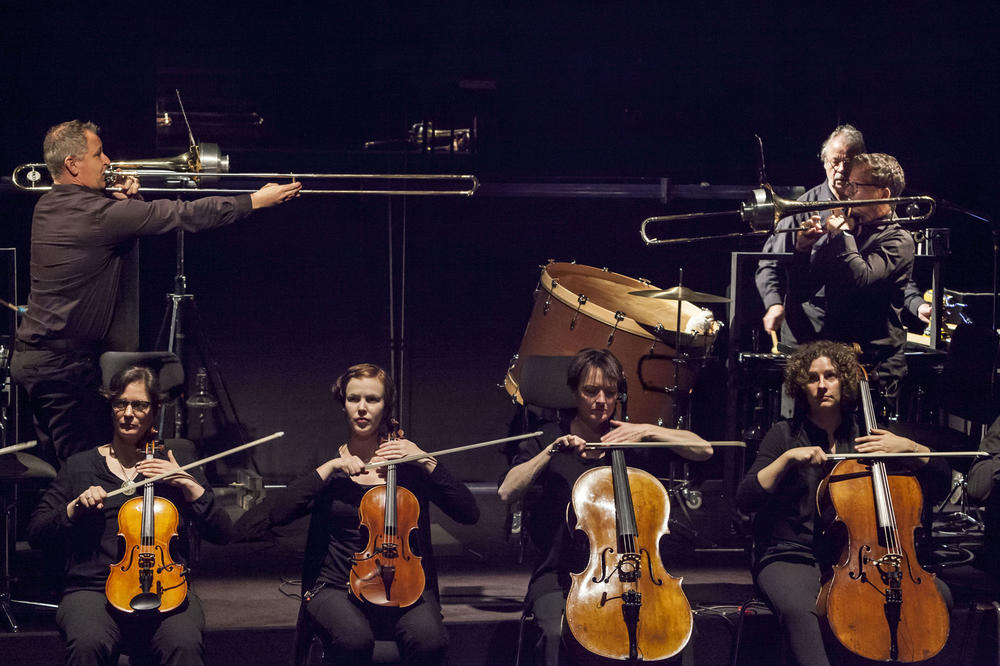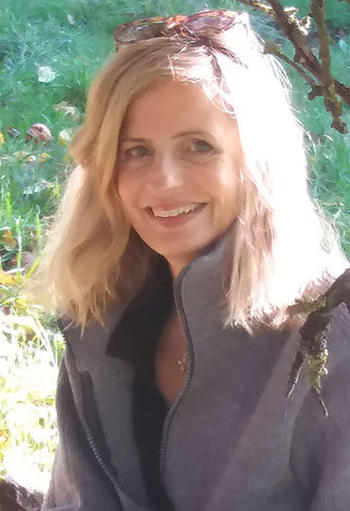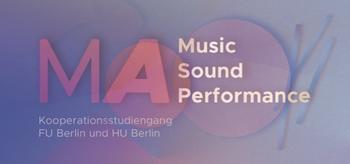Clear the Stage for Music
April 15 to May 31: Applications for New Master’s Degree Program “Music, Sound, Performance” / Interview with Camilla Bork, Professor of Musicology at Freie Universität Berlin
May 09, 2023
The new master’s degree program will impart theoretical knowledge about contemporary and historical forms of music and sound, plus it will prepare young people for careers in musicology.
Image Credit: Franz Kimmel
How did the radio shape the history of music? Why was there no musicology at Freie Universität for over ten years? And what can students learn in the new degree program “Music, Sound Performance” starting this fall? We talked to Camilla Bork to answer these questions and more. Formerly of KU Leuven, Belgium, Professor Bork joined Freie Universität in 2021 and has been hard at work resurrecting the Division of Musicology.
Professor Bork, one of your specialist research areas is radiophonic composition. What is that about?
I’m interested in how the introduction of radio has changed the understanding of music and sound, and how composers reacted to it. In the Weimar Republic, they experimented with new forms in many ways. For example, a “Radio Experimentation Center,” known as the “Rundfunkversuchsstelle,” was founded in 1928 at the then Berlin College of Music. Acousticians, radio experts, and musicians joined forces there to sound out the artistic possibilities of the new medium. They looked at music from both aesthetic and technical viewpoints. In the process, they not only laid the groundwork for what we know today as electronic music, but also for a new understanding of sound.
Before you were appointed as professor, musicology lay more or less silent for many years at Freie Universität. Why was that?
You’re right. Musicology was one of the founding disciplines of Freie Universität, and we had a very important institute here for decades. But then came German reunification, and savings were called for. And, during the resulting restructuring work, it was decided that Berlin’s musicology courses would be mainly held at Humboldt-Universität. The musicology division at Freie Universität was then discontinued in 2015 – after Albrecht Riethmüller became professor emeritus. The efforts to revive musicology did not cease though. Eventually, the Institute of Theater Studies was able to set up a musicology professorship, which I took on. I’ll have a postdoctoral researcher and another member of staff to support me. We’re in the process of hiring someone for that position.
Thanks to the new master’s degree program “Music, Sound, Performance,” students can take up musicology at Freie Universität. What lies in store for them?
The course will focus on the performance of music – whether it be musical theater, concerts, live performance, or sound installations. On the one hand, we’ll teach theoretical knowledge about contemporary and historical forms of music and sound. On the other, we’ll prepare young people for careers in numerous areas of musicology. Digitalization, global orientation, and also the blurring of boundaries between different art forms are all creating new challenges in many music-related jobs. For example, the area of “curating music and sound” is new and is increasingly a key factor in exhibitions and also at festivals. The course looks at practical aspects to a great extent. Curators, artists, and producers are on hand in collaborative seminars to advise students on how to bring their projects to life. Seeing as we are based at the Institute of Theater Studies, we can benefit from synergies with the neighboring disciplines of theater and dance. On top of that, we are collaborating with the musicology institute at Humboldt-Universität and can also draw on their wide-ranging expertise.
How and where can students apply for the master’s degree course?
The application phase for the course commencing in the coming winter semester will run from April 15 to May 31. In April, we will be staging various information sessions – both online and in person. The details can be found on the degree program web page.
Musicology at Freie Universität is soon to be supported by a further professorship. You managed to secure funding from the Ernst von Siemens Music Foundation for this post.
Yes, I’m really pleased about that. To mark its fiftieth anniversary, the Ernst von Siemens Music Foundation called for applications for a guest professorship within the German-speaking world. We managed to win over the jury with our concept – that’s a major success. The professorship funding amounts to 1.25 million euros in total and will run for five years.
Is there a special focus of the professorship?
The guest professor’s research will revolve around new music. The Ernst von Siemens Music Foundation wants to boost this area of musicology education in particular. The spectrum will range from the avant-garde music of the fifties and sixties right up to the present day. The professorship should also establish new contact points between musicology and practice: for example, artist residencies will be set up as a means to strengthen collaborations with music creatives.
Do you know when the professorship will be awarded?
We are currently receiving applications. So, we look forward to hearing from anybody who is interested. The professorship already begins in the winter semester. At the end of the five-year funding period, Freie Universität will continue the position in a slightly different form. So, we’re not just making a brief guest appearance: we’re building lasting structures for musicology at Freie Universität.
Dennis Yücel conducted the interview.
Further Information
- Information on master’s degree program
- Press release from Freie Universität Berlin
- Information on guest professorship funded by the Ernst von Siemens Music Foundation
Contact
Prof. Dr. Camilla Bork, Department of Philosophy and Humanities, Freie Universität Berlin, Email: musik@theater.fu-berlin.de



